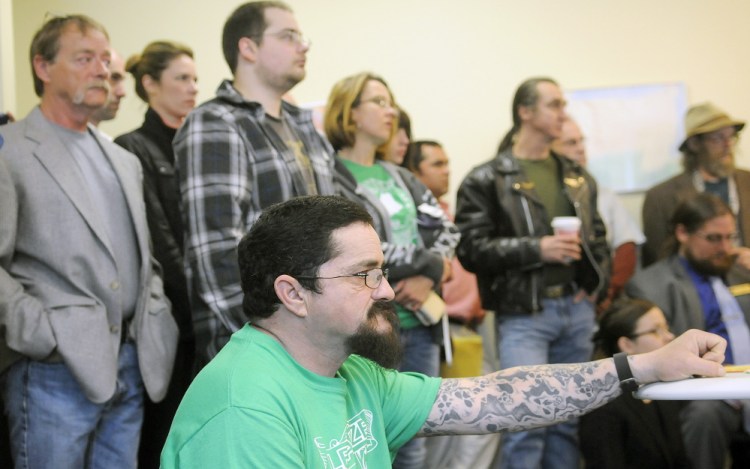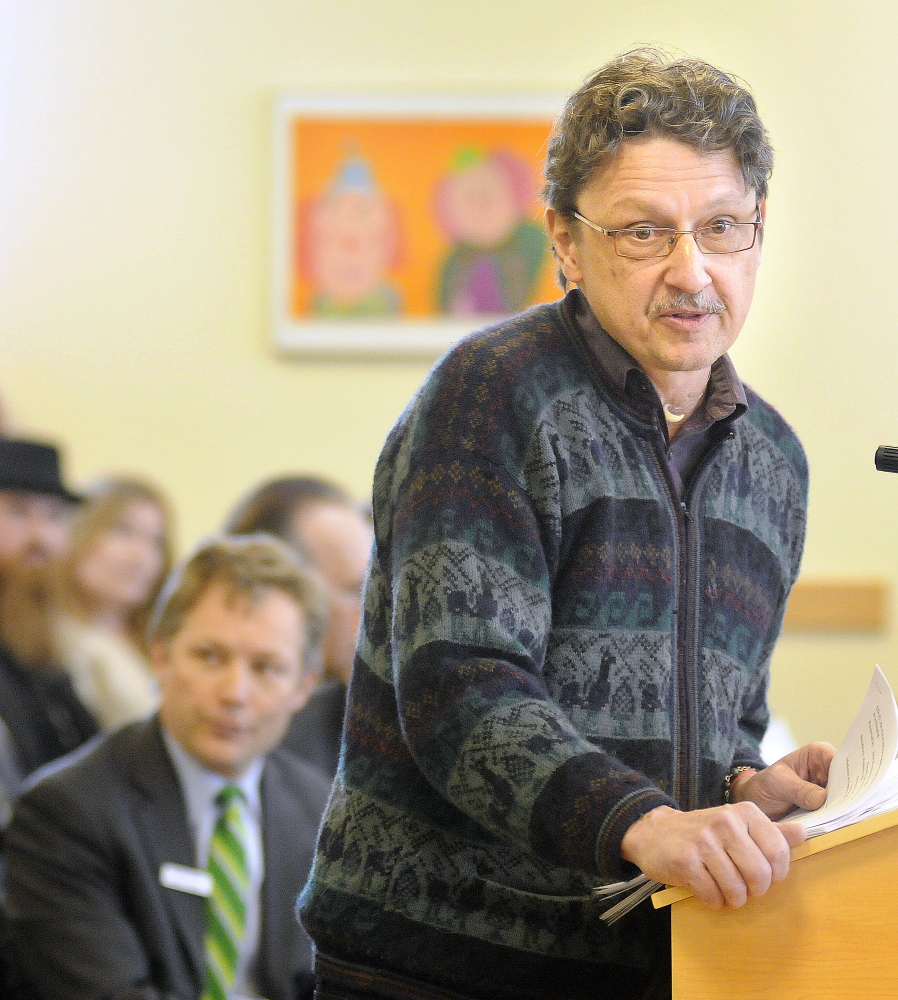AUGUSTA — Samantha Brown doesn’t mince words when she talks about the cannabis therapy she uses to treat her 3-year-old daughter’s debilitating seizures.
“It’s her only chance at surviving life,” Brown told a committee of lawmakers considering changes on Monday to the state’s medical marijuana laws.
But in the past year, her daughter Kaylee has been hospitalized twice, putting Brown in the “uncomfortable” position of either obeying hospital bans on the drug or sneaking medication to her daughter. She chooses to continue giving Kaylee medical marijuana.
“Patients need to be allowed to do what’s right for their bodies,” Brown said.
The mother from South Berwick was among the nearly two dozen people who testified in support of L.D. 35, a bill sponsored by Sen. Eric Brakey, R-Auburn, co-chairman of the Health and Human Services Committee, that would allow patients to use a tincture or other smokeless form of medical marijuana in hospitals.
MARATHON DAY OF TESTIMONY
The hearing on L.D. 35 was part of a marathon day of testimony on a dozen bills that would amend that state’s medical marijuana law. Other bills would create guidelines for inspections of caregivers’ cultivation sites, remove the limit on the number of patients a caregiver could serve, remove the debilitating condition qualification to become a patient and allow marijuana testing facilities.
More than 150 people packed the Health and Human Services Committee room and adjacent hallway as they waited to testify.
During more than two and a half hours of testimony on the bill, patients and caregivers described situations in which patients have been denied access to their cannabis therapy or were forced to take it surreptitiously because most Maine hospitals prohibit its use.
Lawmakers and advocates say patients and families are hesitant to say which hospitals look the other way because they don’t want those hospitals to start cracking down to stop the informal arrangement.
Susan Meehan, whose daughter uses medical marijuana, said the committee should support the bill so patients and their caregivers can continue to use effective therapies even when they must stay in the hospital.
“I will not put my daughter’s life in danger by stopping a medication,” she said.
But several representatives of hospitals and doctors said allowing medical marijuana in the facilities puts them in the position of potentially losing federal certification and funding. Because they are required to follow both state and federal laws, hospitals could lose their U.S. Drug Enforcement Administration license to dispense many medications if they permitted marijuana use in their facilities, according to Brian Marden, senior director of pharmacy at Maine Medical Center in Portland.
Both MMC and Eastern Maine Medical Center in Bangor dispense marinol, a synthetic form of marijuana, although officials say it’s unclear whether it is as effective as medical marijuana. According to hospital officials, EMMC also permits use of – but doesn’t dispense – cannabidiol oil, which is derived from the hemp plant. Maine Medical Center doesn’t allow the use of any products from the cannabis plant.
Jeff Austin of the Maine Hospital Association said that while many hospitals are not saying yes to medical marijuana, they also aren’t saying no.
“They are looking for a path to allow it to be used,” he said.
RISK SMALL, CONSEQUENCES GREAT
Austin said hospitals would feel more comfortable allowing patients to use medical marijuana in hospitals if the state – which does compliance enforcement on behalf of the federal government – provided guidance to say it was a permissible use for hospitals. Otherwise, hospitals fear they could lose Medicare reimbursements, he said.
“I think the risk (of losing federal certification) is small, but the consequences are great,” he said.
Dr. John Woytowicz, a faculty member at Maine Dartmouth Family Medicine Residency in Augusta and a longtime advocate of medical marijuana, said allowing medical marijuana in hospitals is “long overdue.” He understands the hospitals’ concerns, but says the focus needs to be on how doctors can best treat patients.
“It is clear that the federal government has not intervened in Maine to harass or withdraw federal licenses because the law in Maine works very well,” he said.
The committee also heard several hours of testimony on a group of bills that would remove the limit on the number of patients caregivers can serve, provide police officers with lists of registered caregivers and outline processes for inspections of caregiver cultivation sites, among other changes.
Caregivers from across the state asked lawmakers to remove the cap on the number of patients, but keep in place the limit of 30 plants currently outlined under state law. Rep. Diane Russell, D-Portland, who is sponsoring one of two bills that would remove the limit, said caregivers who grow plants successfully should be allowed to sell their excess product to additional patients instead of destroying it or giving it away to patients for free.
“It’s not really good business to give your product away,” said Dan Brown, a caregiver and farmer from Blue Hill who said he expects to have excess product.
BILLS ADDRESS INSPECTION
The committee also heard testimony on two bills that would allow the Department of Health and Human Services to inspect caregiver cultivation sites. Caregivers testified that they don’t mind being inspected, but they would like 24-hour notice, like other small businesses.
“Caregivers should not be treated like criminals. They should be treated like legitimate businesses,” said Hillary Lister, a caregiver from Athens.
Caregivers became alarmed this month after learning that DHHS had contracted with the Maine Sheriffs’ Association to investigate complaints against caregivers. DHHS defended the practice, saying it regularly hires vendors to perform such services and was only responding to complaints about specific growing operations.
State law already permits DHHS to conduct random inspections of registered medical marijuana dispensaries, and Rep. Tom Saviello’s bill, L.D. 726, clarifies that caregivers also are subject to the same unscheduled compliance checks. A similar bill proposed by Rep. Deb Sanderson, R-Chelsea, allows the compliance checks but with 24-hour notice.
Gillian Graham can be contacted at 791-6315 or at:
Twitter: grahamgillian
Copy the Story LinkSend questions/comments to the editors.






Success. Please wait for the page to reload. If the page does not reload within 5 seconds, please refresh the page.
Enter your email and password to access comments.
Hi, to comment on stories you must . This profile is in addition to your subscription and website login.
Already have a commenting profile? .
Invalid username/password.
Please check your email to confirm and complete your registration.
Only subscribers are eligible to post comments. Please subscribe or login first for digital access. Here’s why.
Use the form below to reset your password. When you've submitted your account email, we will send an email with a reset code.